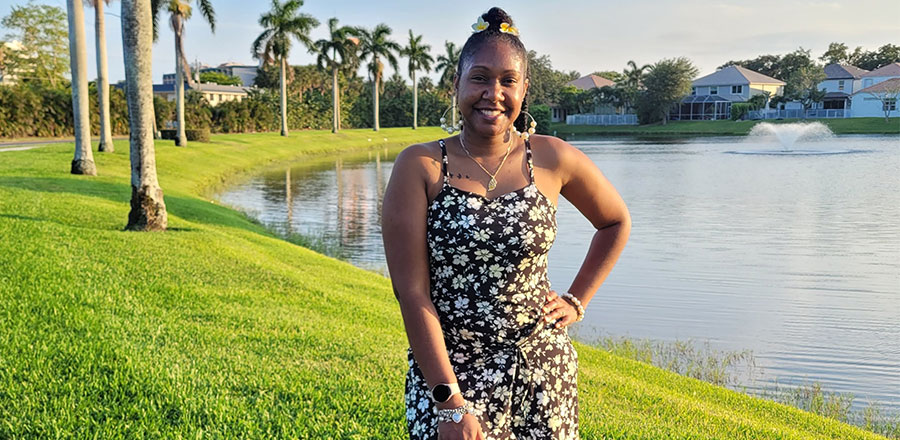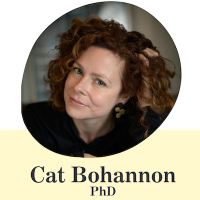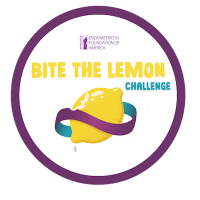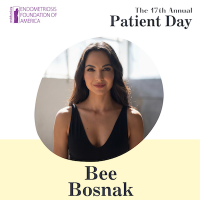
In part one of my endo story, I was six surgeries in and finally making peace with having endometriosis. I wanted to raise awareness by telling my story to help others with the same condition. After my sixth surgery, I thought things would be better. They weren’t.
A few months later, I started having horrible cramps, but only on the right side, and with that came severe right leg pain. I’d had pain in my leg before, but never like this. I returned to the hospital, and after multiple tests, the doctor said I had a huge cyst on my right ovary growing where I’d just had my surgery. We decided not to remove it but to monitor it, along with the pain.
A few months after that, I woke up one morning to my body feeling weird. I had weakness on the right side and didn’t know why. However, I still went to work and tried to push through. The next day, the weakness worsened. I called my doctor, who told me to go to the hospital. When I got there, I couldn't lift my right arm and could barely walk. Doctors thought I was having a stroke, and I didn’t disagree. My grandma had died a year prior from a stroke, and I was scared. After several exams, doctors determined it wasn’t a stroke but didn’t know what it was. They kept me in the hospital for a week for observation and to begin physical therapy.
During the following weeks, I did physical therapy and saw multiple neurologists but still couldn’t find answers. It wasn’t until I was at physical therapy one day when the doctor mentioned an article he’d read about a woman in my situation, meaning it was related to endometriosis.
How was that even possible after so many surgeries?
At my next doctor's appointment, I told him what my physical therapist said. He agreed that the symptoms could be from endometriosis because my nerves were possibly affected during one of my surgeries, or the endometriosis could have spread to other parts of my body. In all my years dealing with this, I had no idea it could spread outside the pelvic region.
For five months, I couldn’t work or adequately take care of myself. Someone had to always be with me to help me go to the bathroom, shower, and cook. I became dependent on others for rides to the doctors and physical therapy, which I had to do three times a week. After five months, I finally regained strength on my right side as my arm became stronger, but my right leg still had weakness. As a result, I had to use a cane to walk. I was embarrassed because I was just 33 years old. I became so depressed that I didn’t want to leave my house. In addition, my periods got heavier and the pain worse. I couldn’t catch a break.
I told myself I would fight to stay out of the hospital as much as possible because I was sick and tired of being there—but I couldn’t avoid it. I tried every medication my doctors recommended, changed my diet, and exercised more, but nothing made a difference.
My endometriosis had taken over.
I was bleeding heavily for two weeks and in excruciating pain. When my mom took me to the doctor, I shook and felt weak. After checking my vitals, the doctor said he would send me to the emergency room because my blood pressure was significantly low and I was going into shock. I didn’t think I was going to make it.
Weeks later, I found myself preparing for my seventh surgery, which put me in a severe state of depression. I didn’t want to talk to anyone, wasn’t sleeping properly, and barely ate. I hated life. I no longer cared about anything or anyone—except my son. If it weren’t for him, I would probably still be in that dark place. After the surgery, I promised myself again that I wouldn’t have any more surgeries because I wouldn’t be able to handle it mentally or physically.
I expected to regain full strength in my right leg, but I didn’t. I continued to have severe pain and swelling. It wasn’t just occurring during my periods, but randomly. After all the doctors I’d seen, I still didn’t have answers. When someone would ask me what happened to my leg, I would just say, “I don't know,” or “It’s a long story.” How can I explain to someone what’s happening when even I and doctors don’t know? Trying to get answers became very expensive because I was being referred to many different doctors. It got to the point where I stopped trying to find answers since no one knew what was happening.
A year later, with no changes in my health, I prepared for my eighth surgery—this time to have a hysterectomy. I was just 34 and about to have a surgery I didn’t want, but I had to so that I could try to live a normal life.
After the surgery, I wasn’t prepared for the side effects of being in menopause. Hot flashes, night sweats, and an inability to sleep affected my mood. I didn’t want to be bothered. I also didn’t take into effect the mental toll it would have on me. Having a hysterectomy meant I couldn't have more kids when I really wanted another one. As a woman, I feel that it’s my job to be able to give my future husband a child of his own. Now, I can’t. Just thinking about what I gave up made me cry. I felt as if I was less of a woman.
Despite the emotional rollercoaster, I continued to be positive by focusing on things that made me happy because I didn’t want to be in that dark place anymore. I spent time with family and friends, turned to arts and crafts, and went out of the country with my son to focus on being a mother and self-love. When you’ve been sick for most of your life, you start to look at yourself negatively. Due to this condition, I didn’t feel pretty. I didn’t believe I deserved happiness because people have walked out on me for always being sick and in the hospital. I found myself constantly apologizing for being sick. But taking that time away allowed me to love myself no matter what.
I’m not sorry for having endometriosis because I’m still alive. Yes, there have been some close calls when I didn’t think I would make it, but I did because I refused to give up. I refused to let this dark cloud follow me and ruin my relationships with others. I still get emotional and down at times, but thanks to my awesome support system of family and friends, which I’d never had before, I can get through it. And I’ll continue to spread awareness and offer support to everyone else with endometriosis in any way I can.
Patricia Hackshaw was born in St. Croix U.S.V.I., and moved to West Palm Beach, Florida, when she was one. She is the mother of a 14-year-old and works in education as an elementary math interventionist. Patricia enjoys reading, going to the beach, and spending time with family and friends. Although she has been living with endometriosis for 12 years, she aspires to continue to be an advocate for those with the disease.
Editor’s Note: Patricia Hackshaw first shared her story with EndoFound in November 2020, which you can read at www.endofound.org/the-hospital-became-my-second-home-patricia-hackshaws-endo-story. This story today, three years later, is an update on her condition.
*Patient stories submitted to EndoFound.org are the patient's views, not necessarily those of the foundation. All testimonials are from real patients, may not reflect the typical patient’s experience, and are not intended to represent or guarantee that anyone will achieve the same or similar results.









